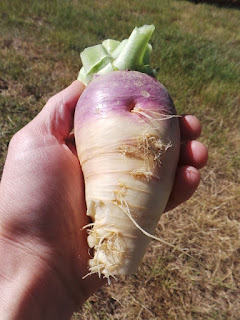… Is the only possible explanation.
Extraterrestrial, supernatural, parahorticultural—something freaky
is afoot at Fencebroke.
Ebony Pearl is missing. She's a—was—a
beautiful, unusual Rhododendron with
dark, sultry leaves formerly planted about a foot from our front
door. Then she vanished. Overnight. In her place, there is …
nothing. No severed stem, no leaves, no hole in the ground where
once her roots held tight. There is no evidence of a struggle. She
was not dug up, cut down, ripped from the ground, or stricken in
place. She was not in poor health, did not give any indication of
dissatisfaction, malaise, or impending doom. She did not, as far as I
can tell, even die. She's just not there.
It is
as though she never were there. Like I had merely forgotten to plant
something in that conspicuous 3x3 foot space I walk past on the way
to my car every morning. Like the last year and a half's worth of
fond gazes in her direction were nothing more than a recurring dream
or drawn-out deja vu. Already her memory fades.
Did I
imagine the whole thing? Did I ever have a rhody called 'Ebony
Pearl'? Or is this yawning void in my garden indicative of some
deeper, deleterious force at work in the fabric of my own being?
Probably
not, but, you know … wow. What if?
And if
she was, in fact, abducted—then by what hand? What agent's idiom
could possibly include the surgical excision of rare plants from
beneath a gardener's watchful eye. And to what end? Aliens probing
for horticultural arcana in Fencebroke's borders? The astronomically
improbable manifestation of quantum uncertainty on a macro scale
right between the witch hazel and heather? Government experimentation
in targeted teleportation run amok? Jealous neighbors? Rats?
Yeah,
maybe just rats. They probably gnawed off the trunk just below the
soil line and hauled off Ms. Pearl kicking and screaming into the
night. Okay, fine, but 1.) How? 2.) Why? And 3.) What the hell, rats?
I'm
getting kind of worked up about this Ebony Pearl thing. In my time as
a gardener, I've killed lots of plants through neglect, ignorance,
misfortune, and spite, but I've never yet lost one to … this.
Whatever this is. I feel powerless, exposed, and confused. Not to
mention paranoid. Didn't there used to be a plant there? How about
there? Whatever happened to that cool Nandina
I planted last year?
What
if it happens again?
What
if they come back for me?
That's
it, I'm getting security cameras.








